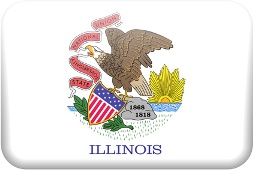 Residents of the Prairie State who plan on operate an automobile on the state’s roadways must comply with the mandated Financial Responsibility (FR) laws. Similar to the majority of the United States, motorists must have the means in place to pay for bodily injury and/or property damage that they may cause as a result of a traffic accident with their vehicle. Most IL drivers choose to abide by this law by maintaining a car insurance policy which meets the legal requirements of the state.
Residents of the Prairie State who plan on operate an automobile on the state’s roadways must comply with the mandated Financial Responsibility (FR) laws. Similar to the majority of the United States, motorists must have the means in place to pay for bodily injury and/or property damage that they may cause as a result of a traffic accident with their vehicle. Most IL drivers choose to abide by this law by maintaining a car insurance policy which meets the legal requirements of the state.
Individuals who choose to purchase automobile coverage must have a policy consisting of two types of protection; liability and uninsured/underinsured motorist. The liability portion of an Illinois auto insurance policy must consist of minimum limits of $20,000 for bodily injury to one person, $40,000 for bodily injury to two or more people and $15,000 for property damage. The uninsured/underinsured motorist must meet the minimum bodily injury liability limits at $20,000 and $40,000; however, rather than pay the injuries or property damage of a third party, this will pay for the injuries sustained by the policyholder and/or passengers and those considered “insured” as a result of a traffic accident involving a driver without a policy, does not have enough coverage to pay for injuries or victim of a hit-and-run.
Motorists caught and convicted of operating an automobile without valid policies may have license plates suspended and the driver can face a minimum fine of $500. In addition, those caught driving while license plates are suspended for a previous coverage violations can receive a minimum fine of $1,000.
It is often suggested that motorists purchase coverage above and beyond their state’s requirements and raising liability limits is often the first suggestion offered by industry professionals and insurance department. The cost of medical care can be quite expensive, especially if a motorist were to cause an accident serious enough to require a hospital stay, permanent disfigurement, broken bones and/or rehabilitation. The $20,000 limit required by the state can easily be exceeded should this become the case and the responsible party could be held accountable for paying any remaining compensation necessary to pay for medical expenses suffered by the person injured. Consumers may want to consider raising liability limits to the highest amount that can be afforded.
Although not required, Comprehensive and Collision may be necessary and beneficial. This will pay for damages sustained by the vehicle of the insured and is often required by financial institutions for individuals that have taken out a loan on an automobile. Without this coverage, a motorist may find themselves responsible for repaying the loan regardless if the the vehicle is damaged or even inoperable. Residents can visit the Illinois Department of Insurance for information on a number of additional protection options including Medical Payments, Rental Reimbursement, Towing and Uninsured Motorist Property Damage (UMPD).
Source: http://www.onlineautoinsurance.com/illinois/